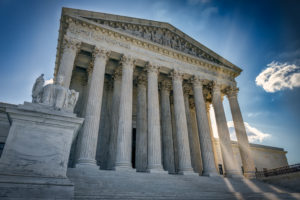The United States Supreme Court’s 2022-23 term ended with all the excitement of a well-orchestrated symphony. The protection and expansion of freedom has a resounding, liberating tone that can move the heart and soul of all it touches. Concerned Women for America activists heard it today as we stood in the steps of the Court as they delivered a momentous First Amendment victory to Lorie Smith and all Americans in 303 Creative v. Elenis.
The Court gave us a resounding victory by stating what should be obvious: “The First Amendment prohibits [government] from forcing a website designer to create expressive designs speaking messages with which the designer disagrees.”
Recall that Lorie Smith, owner of 303 Creative, a design studio specializing in graphic and website design, wanted to promote causes consistent with her religious beliefs. But as she expanded her business to create wedding websites, she immediately encountered the same irrational hostility that Jack Phillips, of Masterpiece Cakeshop, faced from government officials in Colorado. They insisted Lorie must promote same-sex weddings, if she is going to work on wedding websites at all. Lorie works with all people but decides which projects to design based on the message they express.
Legally speaking, Colorado was trying to force Lorie to say things through her art that go against her faith and require her to create designs that violate her beliefs about marriage. And the lower courts had agreed with that.
But today, in a 6-3 decision, the Supreme Court reverses the lower courts and sends a clear message by stating, “The First Amendment’s protections belong to all, not just to speakers whose motives the government finds worthy.”
“[A]biding the Constitution’s commitment to the freedom of speech means all will encounter ideas that are ‘misguided, or even hurtful,’” wrote Justice Gorsuch for the majority, joined by Chief Justice John Roberts, and Justices Clarence Thomas, Samuel Alito, Brett Kavanaugh, and Amy Barrett. “Consistent with the First Amendment, the Nation’s answer is tolerance, not coercion. The First Amendment envisions the United States as a rich and complex place where all persons are free to think and speak as they wish, not as the government demands.”
The court concludes Colorado applies its public accommodation law too broadly: “no public accommodations law is immune from the demands of the Constitution.” A state can know now that it has gone too far when they are “deployed to compel speech.”
At oral arguments the state seemed to shift their argument, knowing it was losing the compelled speech argument, to say that Lorie Smith’s speech was really incidental. But the Court pointed to the stipulated facts, which agreed that “Ms. Smith does not seek to sell an ordinary commercial good but intends to create ‘customized and tailored’ expressive speech for each couple ‘to celebrate and promote the couple’s wedding and unique love story.’” Therefore, it was easy for the court to see what was happening. “Colorado seeks to compel just the sort of speech that it tacitly concedes lies beyond its reach.”
Ruling for the state would place Lorie in an untenable position, the Court reasoned, “If she wishes to speak, she must either speak as the State demands or face sanctions for expressing her own beliefs, sanctions that may include compulsory participation in ‘remedial . . . training,’ filing periodic compliance reports as officials deem necessary, and paying monetary fines.” “As surely as Ms. Smith seeks to engage in protected First Amendment speech, Colorado seeks to compel speech Ms. Smith does not wish to provide.”
Justices Sonia Sotomayor, Elena Kagan and Ketanji Brown Jackson dissented from the Court’s opinion, but their contention seems to be that they approve of the government’s message. “Perhaps the dissents find these possibilities untroubling because it trusts state governments to coerce on ‘enlightened’ speech,” wrote Justice Gorsuch, “But if that is the calculation, it is a dangerous one indeed.” The bottom line is, “the dissent abandons what th[e] Court’s cases have recognized time and time again: A commitment to speech for only some messages and some persons is no commitment at all.”
We applaud the Court for standing on the side of the Constitution, inalienable rights, true justice, and freedom. All Americans, regardless of personal beliefs, win under today’s sensible ruling.





